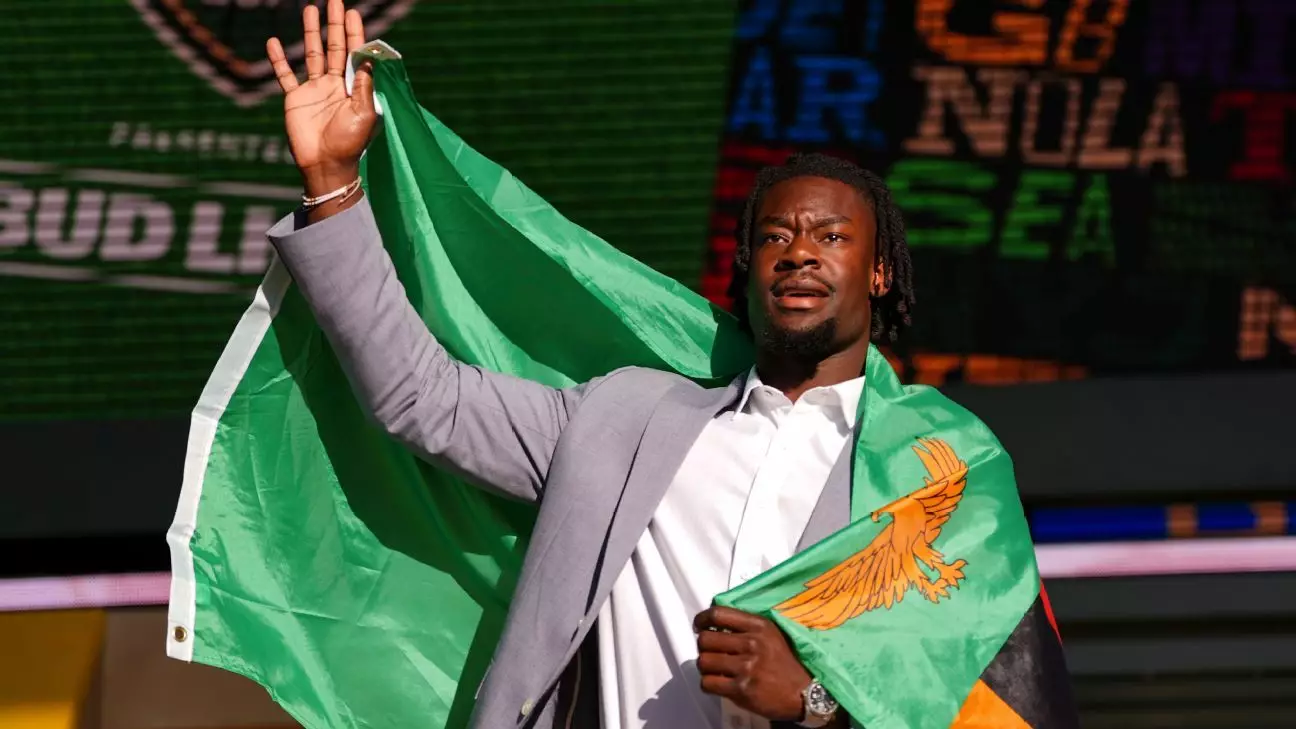In the world of sports, stories of athletes rising from obscurity to prominence often inspire fans and aspiring players alike. Mapalo ‘Maz’ Mwansa’s journey is a testament to this narrative, one that defies the odds and showcases the power of encouragement and a supportive community. Growing up in Peterborough, England, to Zambian parents, Mwansa’s early life was defined not by competitive sports but by a passion for soccer, inspired by legends like Manchester City’s Yaya Touré. However, a seemingly inconsequential moment during an informal sports day would ignite a flame of ambition in Mwansa, pushing him towards American football—an entirely new avenue that he had not initially considered.
His acquaintance, Henry Rowland, a current player in the European League of Football, played a pivotal role in redirecting Mwansa’s path. Observing Mwansa’s impressive athleticism during a casual competition, Rowland remarked, “What a waste,” upon learning about his lack of competitive sporting background. This seemingly off-handed comment proved to be a turning point, awakening Mwansa’s ambition and prompting him to explore the realm of American football. This unexpected pivot illustrates the importance of seizing opportunities and the significant influence of mentorship in shaping an athlete’s career.
The Discovery of Passion
Mwansa’s newfound interest in American football soon became a deep-seated passion. Influenced by popular documentaries and the growing culture surrounding the sport, he immersed himself in learning the ins and outs of the game. The shift from soccer to football was not merely a transition; it was a profound change in his life’s direction. By joining the university team at Loughborough, he began the rigorous journey of mastering the sport. Initially aligned to the IPP (International Player Pathway) Program, Mwansa faced a steep learning curve, transitioning from defensive end to the EDGE rusher position.
In his journey, he embodied the essence of a self-starter, nurtured by an understanding that American football demanded not only physical prowess but also strategic acumen. Mwansa’s determination to hone his tactical skills is notable, recognizing the complexity of the sport that goes beyond just sheer physical ability. His reflections on his learning process demonstrate an admirable blend of humility and ambition, illuminating how critical it is for athletes to adapt and evolve.
Defining the Game: Technique and Strategy
Adapting to a new sport also meant embracing its strategic nuances, and Mwansa quickly grasped that success in American football requires more than just brute strength. His approach—“See ball, get ball”—though seemingly simplistic, reflects the fundamental instincts soccer players often share when transitioning to football. However, Mwansa understands that the sport’s tactical side necessitates continuous refinement of skills and techniques. His comparison to NFL athletes like Nolan Smith Jr. reveals a strategic mindset about his own development. He doesn’t just want to emulate success; he seeks to dissect it and understand the mechanisms that drive excellence at the highest levels.
By leveraging his innate physical attributes—speed and explosive power—Mwansa strives to carve out a niche for himself within the demanding framework of the NFL. His aspirations, rooted in both personal ambition and cultural pride, compel him to not merely participate but to strive for success that resonates beyond just the field.
Representing Zambia: A Cultural Catalyst
Mwansa’s story takes on an even richer dimension as he fervently acknowledges his Zambian heritage. He embodies the voice of a generation keen to reshape perceptions about his homeland’s sporting capabilities. Historically, Zambia has produced notable athletes, yet the broader international recognition often comes tinged with surprise. The pride Mwansa feels in representing Zambia is palpable, as he emphasizes the need to normalize success narratives from his country. He references the unexpected accolades received by fellow Zambian athletes like 400m sprinter Muzala Samukonga, highlighting an ongoing dialogue about the need for visibility and acknowledgment of Zambian excellence in sports.
Mwansa’s commitment to change these perceptions is profound; he doesn’t want Zambia’s achievements to be met with disbelief or astonishment, but instead to be seen as reflective of sustained effort and talent. With aspirations to fortify his country’s representation in international sports, he joins a broader movement advocating for a shift in perception—dismantling the barriers of surprise and skepticism that surround Zambian athletes.
In tracing Mwansa’s inspiring trajectory, what stands out most is not just his sporting prowess but his unyielding determination to harness opportunities, cultivate his identity, and advocate for the legacy of his nation in the world of sports. The convergence of talent, community support, and cultural pride underscores his journey, marking the emergence of a new force within American football.

